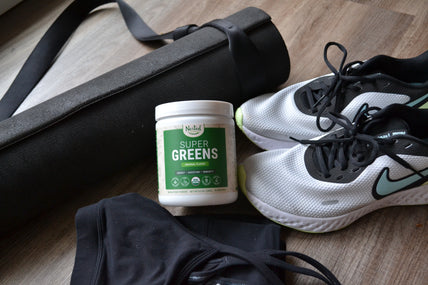Bioavailability of Supplements

When a food product or supplement package says it contains a certain amount of a particular nutrient, it doesn’t necessarily mean that your body will absorb all of it.
That’s because for every nutrient, drug or other dietary substance, there’s a set of factors that influences its absorption and utilization (how it’s transported and used by your body’s cells). Not 100% of the nutrients you consume will make their way through your gastrointestinal tract and into your bloodstream, as the body is only able to use a portion of the nutrients it takes in – a principle called bioavailability.
What’s bioavailability?

Bioavailability is the amount of a given nutrient in food, medications and supplements that is absorbed in the intestines and ultimately available for biological activity in your cells and tissues. Image via lumenlearning.com
The National Institute of Health’s Office of Dietary Supplements defines bioavailability as “the amount of (a given nutrient) in food, medications and supplements that is absorbed in the intestines and ultimately available for biological activity in your cells and tissues”.
When a nutrient is highly bioavailable, it can be digested and absorbed a high percentage of the time and in a dependable way. When it’s poorly bioavailable, digestion and absorption can be much more difficult and much less predictable.
Factors That Hinder Bioavailability
Nutrient bioavailability can be affected by a number of factors, and varies widely from person to person. Even if two people consume the same nutrients in the same form, their bodies may wind up absorbing and utilizing different amounts of it.
In terms of bioavailability, there can be enhancers and inhibitors.
Enhancers make the effects of a nutrient stronger, cancel out the effects of inhibitors, or increase absorption rates. Meanwhile, inhibitors may reduce bioavailability by binding with nutrients and impeding their absorption, rendering certain nutrients insoluble (and thus unavailable for absorption) or by competing for the same uptake system.
Some significant inhibitors to nutrient bioavailability are:
Prescription drugs

Certain prescription medications may interact with supplements, thereby affecting their absorption and bioavailability.
Certain prescription medications may interact with supplements, thereby affecting their absorption and bioavailability.
For example, acid-reducing drugs can impact the absorption of vitamin B12, while antibiotics can destroy “good bacteria” in the digestive tract that help with the digestion and absorption of vitamins and minerals.
*Before you start taking any supplements, you should always check with your doctor or a healthcare professional to discuss possible interactions, and find out what steps you can take to ensure that your body is effectively obtaining and absorbing essential nutrients. It’s important to check for any contraindications to be sure there won’t be any problems with your medication.
Digestive disorders
Conditions such as Crohn’s, irritable bowel syndrome (IBS), chronic heartburn, and celiac disease can seriously undercut the body’s ability to absorb and use nutrients properly.
Alcohol
Alcohol can negatively affect the absorption of nutrients. It promotes the swift breakdown of pills and capsules before they reach the small intestine, which is where absorption occurs.
Alcohol also damages the lining of the stomach and small intestines, which alters or reduces the absorption of vitamins and minerals. Finally, it acts as a diuretic, promoting the excretion of stored minerals like calcium and magnesium.
Caffeine

Alcohol can negatively affect the absorption of nutrients. It promotes the swift breakdown of pills and capsules before they reach the small intestine, which is where absorption occurs.
Similar to alcohol, caffeine reduces nutrient absorption and promotes excretion of key vitamins and minerals. It contains tannins (a type of plant compound), which can inhibit the absorption of calcium, iron, magnesium and B-vitamins if consumed in excess.
Stress
Constant stress can take a toll on your body, putting it into a low-grade, adrenal “fight-or-flight” status that hits the digestive system hard – resulting in digestive problems like indigestion or heartburn. This can affect your body’s digestive efficiency and deplete its nutrient stores.
How To Get The Most Out Of Your Supplements
While many people take vitamins and supplements as a way to enhance their diet, most lack the information necessary to reap the full health benefits from their supplement regime. Things like how, when and what you take your supplements with can actually make a huge difference in how your body absorbs and uses the nutrients they provide.
Here are some basic tips to help you make sure that you get the most out of your supplements:
1. Take them at the right time.

B vitamins, like the ones found in Mood Lift, should be taken during the first half of the day, as these micronutrients have an energizing effect on the body and may interfere with sleep.
Different supplements are best taken at different times of day, or before/after different activities.
For instance, B vitamins, iron and CoQ10 should be taken during the first half of the day, as these micronutrients have an energizing effect on the body and may interfere with sleep.
Meanwhile, calcium and magnesium are best taken in the evening. These minerals help our bodies relax, and may be beneficial for improving sleep and relieving nervous tension.
2. Take supplements with food.
“Almost all supplements should be taken with food for optimal absorption because nutrients work in conjunction with each other,” says Esther Blum, R.D., author of Secrets of Gorgeous.
Most supplements can be quite harsh when taken on an empty stomach. Food provides a buffer that may help prevent an upset tummy or nausea.
Also, fat-soluble vitamins like A, D, E and K need to be taken with a meal containing fat in order to enhance their absorption.
There are some exceptions, like probiotics, which are best taken on an empty stomach (this allows your gut to replenish its internal flora).
3. Increase bioavailability with supportive nutrients.

It’s difficult for the body to absorb the curcuminiods in turmeric if taken all by its lonesome. Adding black pepper to our formulation not only helps boost turmeric’s bioavailability, but it is also a natural pain killer. Double bonus!
Some nutrients help support each other’s bioavailability when consumed together. For example, vitamin C helps enhance the bioavailability of iron. Curcumin (the active ingredient in turmeric) should be taken together with piperine (an alkaloid found in black and white peppercorns), which helps raise the bioavailability of curcumin by as much as 2000%.
On the flip side, it also helps to consider that some nutrients compete with each other for absorption and should be taken separately. Minerals like calcium and iron, for instance, can inhibit each other’s absorption and are best taken at least 4 hours away from each other.
4. Store your supplements properly.
Most supplements should be stored in a cool, dry area, away from harsh temperatures, humidity and direct sunlight. This will help keep them at maximum potency and efficacy.
Contrary to popular belief, not all supplements need to be refrigerated. However, some supplements like flax oil, fish oil and probiotics do need to be kept in the fridge to maintain their quality and shelf life.
Sources:
https://www.happycow.net/blog/what-does-highest-bioavailability-mean/
https://thefitbay.com/how-to-take-vitamins-and-supplements/
http://www.ausnaturalcare.com.au/health/life-style/top-tips-maximise-supplement-absorption
http://www.lifehack.org/articles/lifestyle/5-secrets-getting-the-most-from-your-vitamins-and-supplements.html



